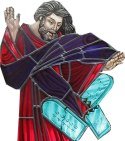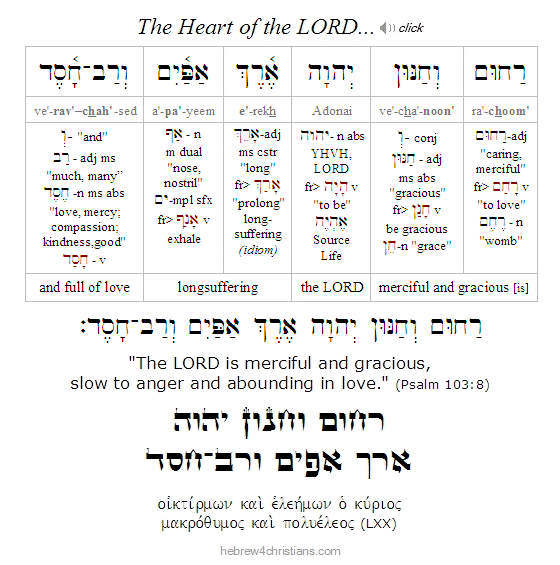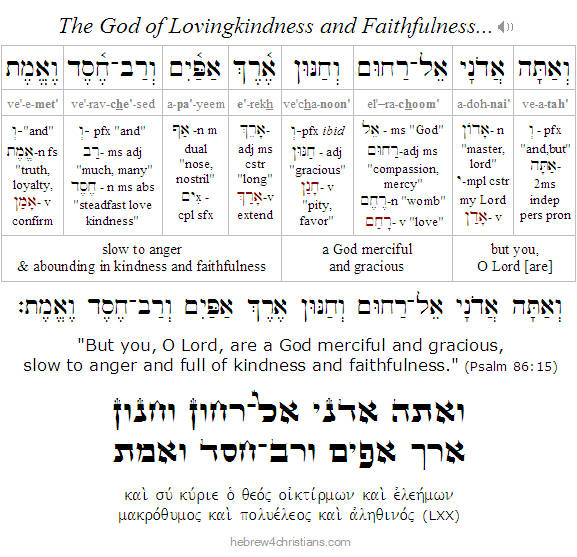|
In the aftermath of the grievous Sin of the Golden Calf (i.e., chet ha'egel: חֵטְא הָעֵגֶל), the LORD threatened to wipe out the Jews because they were am k'she oref (עַם־קְשֵׁה־ערֶף), a "stiff-necked people" (Exod. 32:9). Various explanations for this term have been given, including the medieval commentator Sforno's description that a "stiff necked person" is someone who mulishly refuses to "move his head" and listen to those attempting to guide and help him. The neck, after all, is the "corridor" between the head and the heart, and having a "stiff neck" suggests an inflexible way of thinking and feeling... The rebels who enticed Aaron to create the golden calf were certainly "stiff necked" and obstinate. Despite witnessing the great miracles of the Exodus and experiencing the awesome revelation at Sinai, they obstinately insisted that Aaron make them "gods" that would return them to the "fleshpots of Egypt." Now that's some kind of chutzpah!

After calling them a "stiff-necked people," God said that He would "start over" by wiping out those who were ransomed from Egypt and making Moses' descendants into a great nation. Moses was appalled at the prospect and first appealed to God's reputation in this matter. Would not God's Name be profaned among the Egyptians if the LORD would destroy the people after leading them out of bondage? Moreover, what about the covenant promises God made to Abraham, Isaac, and Jacob (i.e., brit avot)? How could the LORD break His word to the patriarchs of Israel? Because of Moses' quick intercession, however, God's anger was stayed and an "opening" or opportunity was given for teshuvah (repentance).
Moses then rushed down Sinai, tablets in hand, and saw the people dancing about the idol and engaging in debauchery. The two tablets then became heavy and were smashed to the ground (Exod. 32:19). Moses and the Levites then punished the perpetrators and awaited direction from God. After purging the camp of the infidels, Moses appealed to the LORD and said, "Alas, this people has sinned a great sin. They have made for themselves gods of gold. But now, if you will forgive their sin -- but if not, please blot me out of your book that you have written" (Exod. 32:31-32). God then stated that only those who defy Him would be blotted out from His book, but nevertheless informed Moses to go on the journey without Him: "Go up to a land flowing with milk and honey -- but I will not go up among you, lest I consume you on the way, for you are am k'she oref (עַם־קְשֵׁה־ערֶף) - a stiff-necked people" (Exod. 33:3). The LORD continued, "Say to the Israelite people, 'You are a stiff-necked people (am k'she oref). If I were to go in your midst for one moment, I would destroy you. Now, then, leave off your finery, and I will consider what to do to you' (Exod. 33:5).
A midrash says that Moses then gathered up the fragments of the broken tablets and put them inside his "tent of study" (note that this was not the Tabernacle since it had not yet been erected). God then instructed him to relocate his tent far outside the camp, where the Shekhinah Glory descended in plain view of the people (Exod. 33:7-9). There - in the sanctity of his private tent - the LORD spoke intimately to Moses, "face to face" (i.e., panim el panim: פָּנִים אֶל־פָּנִים) from the midst of the cloud...
The "Passion" of Moses
In the solitude of his tent Moses was deeply troubled, even distraught. Undoubtedly he pondered everything in his life that had brought him to this difficult place... Alas, in light of the recent disaster at Sinai, Moses realized he was now at an utter impasse. Would God continue His redemptive plan or was this the end of the great dream? Therefore Moses poignantly appealed to God: "If I have found favor (grace) in your eyes, let me know your ways, that I may know you and continue in your favor" (Exod. 33:13). God responded by reassuring Moses that His Presence would be with him (alone) and that he (alone) would "enter His rest." But Moses protested: "Unless You go in the lead, do not make us leave this place. For how shall it be known that I have found favor in your sight -- I and your people? Is it not in your going with us, so that we are distinct, I and your people, from every other people on the face of the earth?" And the LORD said to Moses, "This very thing that you have spoken I will do, for you have found favor in my sight, and I know you by name" (Exod. 33:15-17). Moses' successful intercession touched God's heart, causing Him to change from a mode of strict judgment (middat ha-din) to one of mercy and forgiveness (middat ha-rachamim). This was the "gospel" moment at Sinai....
Upon hearing God's words of comfort, Moses was so overcome that he exclaimed: "Oh, let me behold Your Presence!" (Exod. 33:18), whereupon God answered, "I will make all My goodness pass before you, and I will proclaim before you the name LORD (יהוה), and I will be gracious to whom I will be gracious, and will show mercy on whom I will show mercy" (Exod. 33:19, cp. Rom. 9:15). Note that Moses would receive the revelation of the Name when he "stands upon the Rock" (Exod. 33:21).
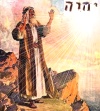
The LORD then instructed Moses to carve a new set of tablets and to meet him again at the place (i.e., makom: מָקוֹם) on the top of Sinai, where He would descend in the cloud to "declare His Name" (Exod. 33:17-34:7). This dramatic experience of revelation was later called middot ha-rachamim, or the revelation of the attributes of God's mercy, and was considered a divine addendum to the original covenant terms. Rabbinic tradition later incorporated the recitation of middot ha-rachamim during Yom Kippur.
What are some of these attributes? Notice first that the LORD calls himself rachum v'chanun (רַחוּם וְחַנּוּן), often translated "merciful and gracious." The noun rechem (רֶחֶם) means "womb" in Hebrew, indicating that God's compassion is like a mother's deep love for her child. The word chanun (חַנּוּן) comes from the word for grace or favor (i.e., chen: חֵן), and indicates that God is a graceful giver who is favorably disposed to help those in need. God is compassionate and favorable to those who call upon Him.
The curious phrase erekh apayim (אֶרֶךְ אַפַּיִם) literally means "long of nose," an idiom used to describe someone who is patient and slow to anger, i.e., "longsuffering" (Prov. 14:29). The word chesed (חֶסֶד), is often translated as "lovingkindess" or "steadfast love," and implies devotion and fidelity. God describes Himself as rav chesed v'emet (רַב־חֶסֶד וֶאֱמֶת), that is abundant in His kindness and faithful love.
It is fascinating to see that this revelation prefigures the New Covenant that was given to Israel. Just as the first set of tablets, based as they were on the justice and holiness of God, were broken, so a second set was given based on the middot (attributes) of the LORD's mercy and grace. Indeed, Yeshua was broken on behalf of the law but was raised again so that all who trust in Him can truly understand that God is "merciful and gracious, slow to anger and abounding in stedfast love and truth" (Exod. 34:6, Psalm 86:15, 103:8).
The revelation of the inner meaning of the Name YHVH (יהוה) was a "gospel" moment for Israel.... The Sin of the Golden Calf revealed that something more was needed, and that the law by itself was insufficient to change the condition of the heart of man...
It can be argued that the revelation of the Name YHVH (יהוה) was a "gospel" moment for Israel. The episode of the Golden Calf revealed that the Jews were unable to keep the law, even though they personally experienced the power of God's deliverance from Egypt and His ongoing care on the way to Sinai. Despite the judgments brought upon Egypt, despite the overthrow of Pharaoh and his armies in the sea, despite the bitter waters made sweet, despite the manna from heaven, despite the miraculous well of Miriam, despite the awesome revelation at Sinai, and despite the pledge of the Israelites: kol asher diber Adonai na'aseh v'nishma, "All that the LORD has spoken we will do, and we will be obedient" (Exod. 19:8; 24:7), the Sin of the Golden Calf revealed that something more was needed, and that the law itself was insufficient to change the inner heart of man (Rom. 3:20). The intercession of Moses on behalf of Israel - his willingness to die on behalf of the people - revealed the heart of the New Covenant (בְּרִית חֲדָשָׁה) of the LORD, the deeper revelation of the God's character of mercy and grace. Apart from God's gracious love and compassion, the law by itself rendered only the righteous sentence of death for Israel...
As the revelation of the Name discloses, the LORD is rav chesed v'emet (רַב־חֶסֶד וֶאֱמֶת), that is, abundant in His kindness and faithful love. This is demonstrated in the sacrifice of His Son for our sins (John 3:16-17; 1 Cor. 15:3-4; 2 Cor. 5:21). "God has done what the law, weakened by the flesh, could not do. By sending his own Son in the likeness of sinful flesh and for sin, he condemned sin in the flesh, in order that the righteous requirement of the law might be fulfilled in us, who walk not according to the flesh but according to the Spirit" (Rom. 8:3-4). Moses indeed entered the land of promise and once again stood with Lord in the cloud on the mountain, though this was the mountain of Zion rather than Sinai (Matt. 17:1-5). Because of the avodah (finished work) and intercession of Yeshua, now we can all find favor in God's eyes once again (for similarities between Moses and Yeshua, see "A Prophet Like Unto Moses").
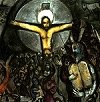
It is interesting to note that immediately after the revelation of God's Name, Moses asked the LORD to return his tent to the center of the camp. "If I have gained Your favor, O LORD, pray, let the LORD go in our midst, even though this is a stiff-necked people (am k'she oref). Pardon our iniquity and our sin, and take us for Your own!" (Exod. 34:9). In light of the newly revealed middot ha-rachamim of the LORD, Moses now referred to God's description of the people as "stiff necked" as an appeal for God's "stubborn" love for His people. What started as obstinacy or stubbornness of Israel's character could be transformed into devotion and strength, if only the LORD would "go in our midst." Indeed, with God's help the negative quality of being "stiff necked" could be transformed into the loyal determination to walk in the ways of the LORD.
Hebrew Lesson
Psalm 103:8 reading (click for audio):
Hebrew Lesson
Psalm 86:15 Hebrew reading:
|


